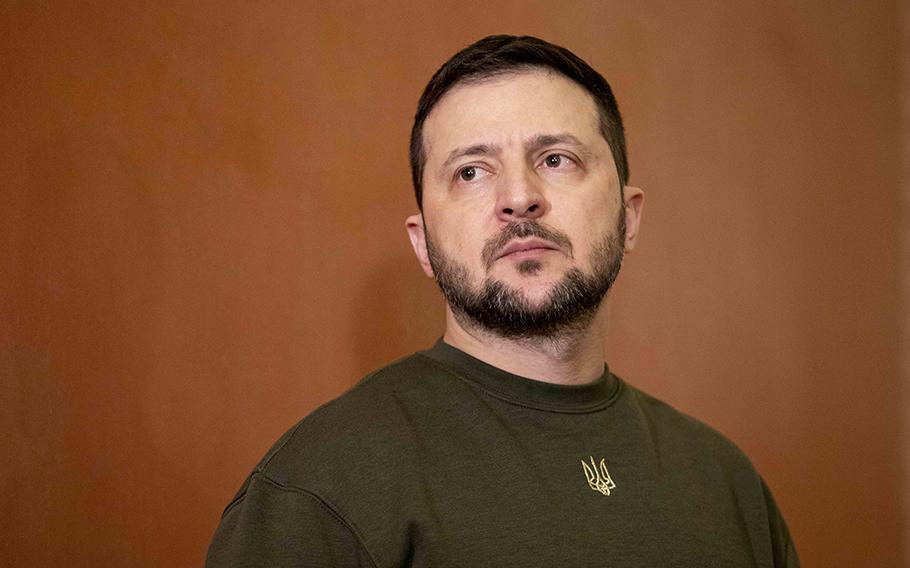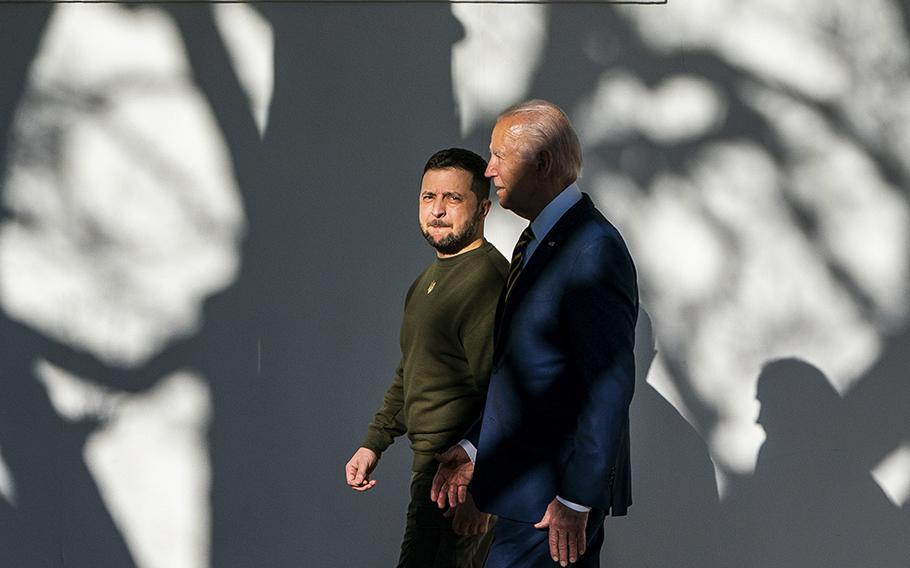Europe
Zelenskyy, in private, plots bold attacks inside Russia, leak shows
The Washington Post May 13, 2023

Ukrainian President Volodymyr Zelenskyy at the U.S. Capitol on Dec. 21, 2022. (Amanda Andrade-Rhoades for The Washington Post)
Ukrainian President Volodymyr Zelenskyy has won the trust of Western governments by refusing to use the weapons they provide for attacks inside Russia and prioritizing the targeting of Russian forces inside Ukraine's borders.
But behind closed doors, Ukraine's leader has proposed going in a more audacious direction - occupying Russian villages to gain leverage over Moscow, bombing a pipeline that transfers Russian oil to Hungary, a NATO member, and privately pining for long-range missiles to hit targets inside Russia's borders, according to classified U.S. intelligence documents detailing his internal communications with top aides and military leaders.
The documents, which have not been previously disclosed, are part of a broader leak of U.S. secrets circulated on the Discord messaging platform and obtained by The Washington Post. They reveal a leader with aggressive instincts that sharply contrast with his public-facing image as the calm and stoic statesman weathering Russia's brutal onslaught. The insights were gleaned through intercepted digital communications, providing a rare look at Zelenskyy's deliberations amid Russian missile barrages, infrastructure attacks and war crimes.
The Pentagon, where senior U.S. military leaders were briefed on the matters outlined in the leaked documents, did not dispute the authenticity of the materials.
In some cases, Zelenskyy is seen restraining the ambitions of his subordinates; in several others, he is the one proposing risky military actions.
In a meeting in late January, Zelenskyy suggested Ukraine "conduct strikes in Russia" while moving Ukrainian ground troops into enemy territory to "occupy unspecified Russian border cities," according to one document labeled "top secret." The goal would be "to give Kyiv leverage in talks with Moscow," the document said.
In a separate meeting in late February with Gen. Valery Zaluzhny, Ukraine's top military commander, Zelenskyy "expressed concern" that "Ukraine does not have long-range missiles capable of reaching Russian troop deployments in Russia nor anything with which to attack them." Zelenskyy then "suggested that Ukraine attack unspecified deployment locations in Rostov," a region in western Russia, using drones instead, according to another classified document.
In a meeting in mid-February with Deputy Prime Minister Yuliya Svrydenko, Zelenskyy suggested Ukraine "blow up" the Soviet-built Druzhba pipeline that provides oil to Hungary. "Zelenskyy highlighted that . . . Ukraine should just blow up the pipeline and destroy likely Hungarian [Prime Minister] Viktor Orban's industry, which is based heavily on Russian oil," the document says.
In detailing the conversation, intelligence officials concede that Zelenskyy was "expressing rage toward Hungary and therefore could be making hyperbolic, meaningless threats," a qualification that does not accompany the other accounts of Zelenskyy suggesting bold military action. Though Hungary is nominally part of the Western alliance, Orban is widely considered Europe's most Kremlin-friendly leader.
When asked if he had suggested occupying parts of Russia, Zelenskyy, during an interview with The Post in Kyiv, dismissed the U.S. intelligence claims as "fantasies" but defended his right to use unconventional tactics in the defense of his country.
"Ukraine has every right to protect itself, and we are doing it. Ukraine did not occupy anyone, but vice versa," Zelenskyy said. "When so many people have died and there have been mass graves and our people have been tortured, I am sure that we have to use any tricks."
The use of long-range missiles to hit inside Russia is a particularly sensitive topic for the White House, which has long worried that the Ukraine conflict could escalate out of control and force a catastrophic standoff between the United States and Russia, the world's largest nuclear powers.

President Biden escorts Volodymyr Zelenskyy to the Oval Office during the Ukrainian president’svisit to Washington on Dec. 21, 2022. (Demetrius Freeman/Washington Post)
Though Washington has given Zelenskyy billions of dollars' worth of advanced weaponry, President Biden has steadily rebuffed the Ukrainian leader's request for long-range ATACMS, shorthand for the Army Tactical Missile System, capable of striking targets up to 185 miles away. Since the start of the war, Biden has said the United States is "not encouraging or enabling Ukraine to strike beyond its borders."
When asked about the intelligence indicating he had weighed the use of long-range missiles to hit Russia, Zelenskyy said it is not something Ukraine is entertaining. "No one in our country has given orders for offensives or strikes on Russian territory," he said.
It is unclear whether the United States has shared accounts of Zelenskyy's plotting with allied nations, but the Ukrainian president continues to enjoy the strong support of Western governments, which have provided him with an increasingly sophisticated array of weaponry.
This past week, Britain became the first Western country to provide Ukraine with long-range missiles. The Storm Shadow, a cruise missile system with stealth capabilities, has a range of 155 miles, far exceeding the 50-mile range of the U.S.-provided HIMARS launchers.
British Defense Minister Ben Wallace said Friday that the missile would give Ukraine "the best chance" to defend itself and would be for use only "within Ukrainian sovereign territory." A spokesman with the British Embassy in Washington declined to comment on whether Zelenskyy's leaked remarks might give London pause about its decision.
The Biden administration says Zelenskyy's intercepted comments are not the cause for withholding ATACMS.
"Ukraine has repeatedly committed to employ U.S.-provided weapons responsibly and strategically when needed to counter Russian aggression, and we are confident that will continue to be the case," said a U.S. defense official who, like others interviewed for this report, spoke on the condition of anonymity to discuss a sensitive topic.
Since last year, Zelenskyy has promised that Ukraine would never use U.S. weapons to strike inside Russia, a pledge the White House says he has fulfilled.
"President Zelenskyy has kept the promises he has made to President Biden, and we do not believe that that will change," said a senior administration official.
One reason for not providing the long-range missiles is the "relatively few ATACMS" the United States has for its own defense needs, Gen. Mark A. Milley, chairman of the Joint Chiefs of Staff, told Defense One in March.
Zelenskyy, however, said he believes the United States isn't sending the weapons because it doesn't trust Kyiv.
"I think they are afraid that we might use them on the territory of Russia," Zelenskyy told The Post. "But I would always tell our partners . . . 'We have a priority target for which we are spending the ammunition packages we receive, and we spend it on the deoccupation of purely Ukrainian territories,'" he said.
While there is no indication that Ukraine has used Western missiles to strike into Russian territory, the same cannot be said for Kyiv's use of armed drones.
Explosions caused by unmanned aerial vehicles have become a regular occurrence in Russia, including in Rostov, where a drone crashed into an oil refinery this month. Ukrainian officials are often coy about the incidents, hinting that they're responsible without directly taking credit.
Two drone attacks in December on Russia's Engels air base in Saratov, more than 370 miles from the Ukrainian border, showed "that we have the ability to reach many kilometers farther than they could expect," Oleksiy Danilov, secretary of Ukraine's National Security and Defense Council, said in an interview earlier this year.
Russia this month accused Ukraine of staging a drone attack intended to kill President Vladimir Putin in the Kremlin. Videos circulating on social media and verified by The Post show two drones streaking toward the Kremlin at about 2:30 a.m. local time. The allegation was forcefully denied by Ukrainian officials, including Zelenskyy.
Not all of the classified documents show Zelenskyy pushing for more aggressive action.
One document describes a plan developed by Ukraine's military intelligence agency last year to conduct covert attacks on Russian forces in Syria using secret Kurdish help. The detailed plot would have opened a new battlefield thousands of miles from Ukraine, but in December, Zelenskyy directed his aides to "cease planning for operations against Russian forces in Syria," the document says, without explaining why the plan was aborted.
Zelenskyy, in the recent interview, said he reserved the right to explore a range of military options.
"I have a lot of generals with whom I work," Zelenskyy said. "And these are my personal conversations."
"The war is about the occupation of Ukraine," he added. "Ukraine must win."
Khurshudyan reported from Kyiv. The Washington Post's Siobhán O'Grady in Kyiv contributed to this report.